Russians win hockey gold with 4-3 OT win over Germany
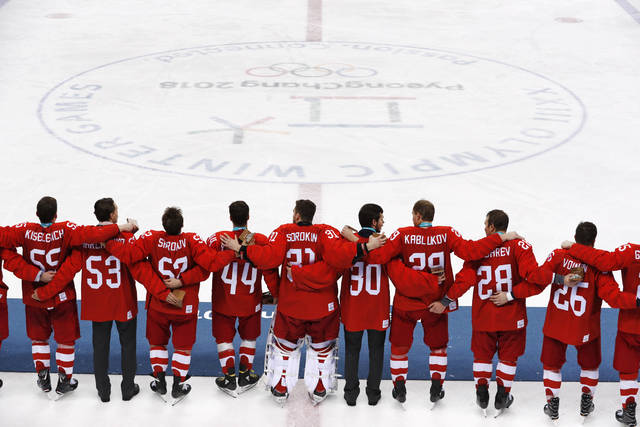
Olympic athletes from Russia celebrate after winning the men’s gold medal hockey game against Germany, 4-3, in overtime at the 2018 Winter Olympics, Sunday, Feb. 25, 2018, in Gangneung, South Korea. (AP Photo/John Locher)
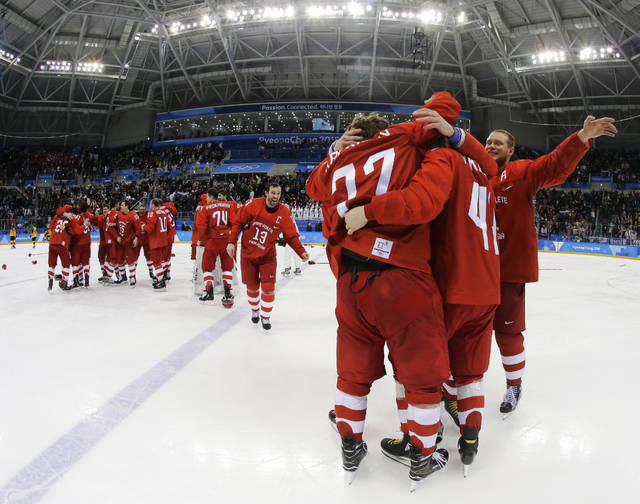
Olympic athletes from Russia celebrate after winning the men’s gold medal hockey game against Germany, 4-3, in overtime at the 2018 Winter Olympics, Sunday, Feb. 25, 2018, in Gangneung, South Korea. (AP Photo/Julio Cortez)
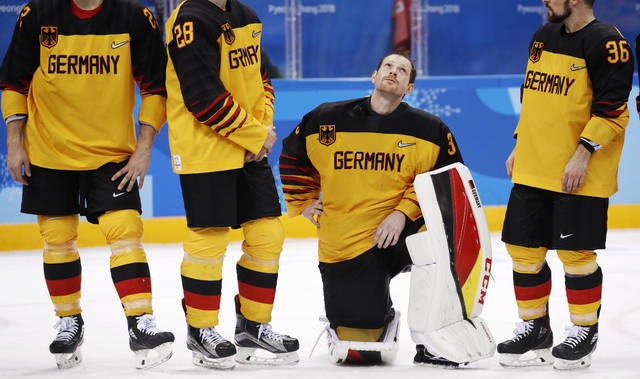
Danny Aus den Birken (33), of Germany, reacts after losing during overtime of the men’s gold medal hockey game against the Olympic athletes from Russia, 4-3, at the 2018 Winter Olympics, Sunday, Feb. 25, 2018, in Gangneung, South Korea. (AP Photo/John Locher)
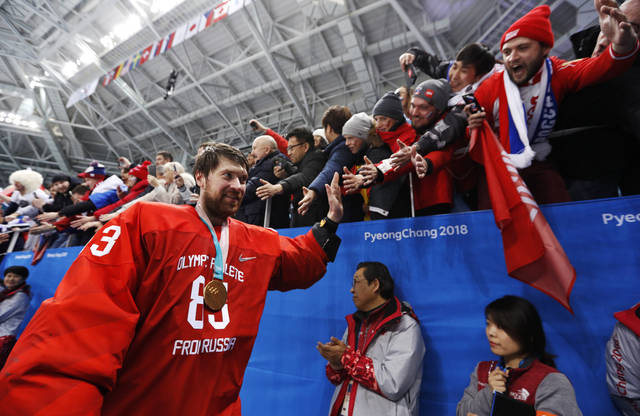
Olympic athlete from Russia Vasily Koshechkin celebrates with fans after winning the men’s gold medal hockey game against Germany, 4-3, in overtime at the 2018 Winter Olympics, Sunday, Feb. 25, 2018, in Gangneung, South Korea. (AP Photo/John Locher)
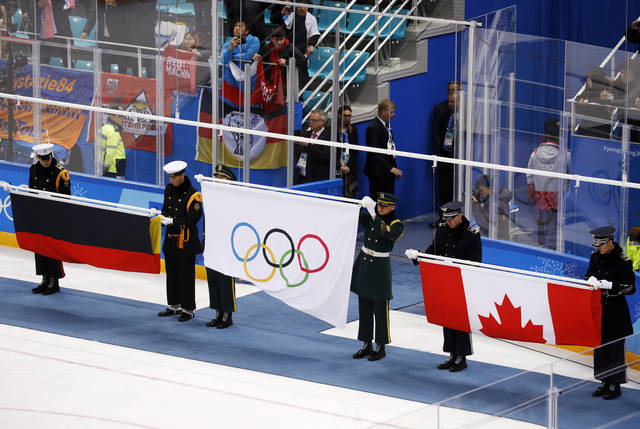
The Olympic, German and Canadian flags are unfurled during the medals ceremony after the men’s gold medal hockey game between the Olympic athletes from Russia and Germany at the 2018 Winter Olympics, Sunday, Feb. 25, 2018, in Gangneung, South Korea. Olympic athletes from Russia won 4-3. (AP Photo/Jae C. Hong)
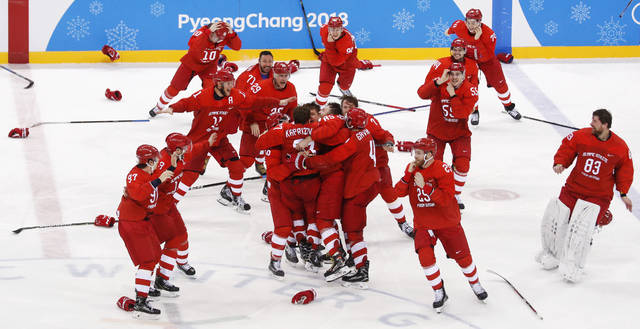
Olympic athletes from Russia celebrate after winning the men’s gold medal hockey game against Germany, 4-3, in overtime at the 2018 Winter Olympics, Sunday, Feb. 25, 2018, in Gangneung, South Korea. (AP Photo/Jae C. Hong)
GANGNEUNG, South Korea — The Olympic anthem was merely background noise, the doping scandal the farthest thing from their minds.
GANGNEUNG, South Korea — The Olympic anthem was merely background noise, the doping scandal the farthest thing from their minds.
As the white flag with the five Olympic rings rose toward the rafters Sunday following the gold medal game in men’s hockey, the champion Russians in their nondescript red-and-white uniforms joined their fans cloaked in red, white and blue and belted out the “State Anthem of the Russian Federation,” drowning out the recorded song that was required as part of International Olympic Committee sanctions.
This Olympic title meant so much more to the Russians, no matter that the tournament was missing NHL players and the “Olympic Athletes from Russia” were all here only after months of scandal.
Joyous players tossed coach Oleg Znarok in the air at center ice as fans let out the same “ROSS-I-YA” chants that filled the arena in Sochi four years ago, where home ice meant nothing as the Russians lost in the quarterfinals. There was no such disappointment this time as the Russians triumphed in the tournament they were favored to win, capturing gold with a 4-3 overtime victory over Germany after Kirill Kaprizov’s power-play goal capped a classic final and gave the nation a jubilant moment following weeks of disappointment.
“We understood the whole thing from the start so we were calm about it,” coach Oleg Znarok said. “Russia is in our hearts.”
The win came only a few hours after the IOC decided against allowing the Russians to march under their flag in the closing ceremony Sunday night after a curler and a bobsledder had positive drug tests.
It didn’t seem to matter to Russian players that they couldn’t wear the Russian Coat of Arms on their chests or that they won their first hockey gold medal since 1992 under the same circumstances as 26 years ago: playing under a neutral flag with the NHL opting to stay home after participating in the past five Olympics.
“The medal is the same with or without the NHL,” said defenseman Slava Voynov, who scored the opening goal with 0.5 seconds left in the first period. “Maybe the tournament was a little different, but the emotions and happiness are the same.”
Russia President Vladimir Putin called Znarok after the victory, which gave the country its second gold and 17th overall medal of the Olympics.
Even with Alex Ovechkin, Evgeni Malkin and Sergei Bobrovsky back in North America, this gold medal was particularly sweet because of the backdrop of sanctions and the Russians’ almost three-decade drought. After International Ice Hockey Federation President Rene Fasel put the first Russian hockey medals of any color since 1998 around the necks of each player, three-time Olympic gold medalist, Soviet Hall of Fame goaltender and Russian Hockey Federation President Vladislav Tretiak gave out handshakes and hugs.
Winning this gold medal at his fifth Olympics meant more to 39-year-old captain Pavel Datsyuk than the two times he lifted the Stanley Cup.
“When you play for your country and I win this medal, this special time it’s more important,” Datsyuk said. “I have accomplished my dream. Now I have no dream.”
The dream Russia couldn’t reach with NHL stars finally happened with Kaprizov scoring the winner on the power play 9:40 into overtime as Patrick Reimer sat in the penalty box for a high-sticking infraction.
A silver medal gave Germany its best finish at the Olympics after capturing bronze in 1932 and 1976.
“We all thought we would be sitting at home watching that final on the couch at home, but here we are,” Germany coach Marco Sturm said. “The boys are going to bring silver home, and they should be very proud.”
It was the first Russian gold medal in hockey since 1992 in Albertville.
This one was expected all along.
Stocked with former NHL players — Datsyuk, Voynov, Ilya Kovalchuk, Mikhail Grigorenko and Nikita Nesterov — the Russians were by far the most talented team in the tournament. U.S. coach Tony Granato said they may be as good as 20 of the 31 NHL teams, and Kovalchuk said the Russians deserved to be in the final.
Oddsmakers made the Russians the favorite, and they showed it after an opening loss to Slovakia, getting better as the tournament went on, which was a complete reversal from Sochi.
“It means a lot,” said Kovalchuk, who was voted tournament MVP. “We didn’t win Olympics since ‘92 so it was while ago. And that was our dream. This was my dream from when I was 5 years old when I started to play.”
The skill primarily from the Kontinental Hockey League was on full display with the gold medal at stake — and the Russians needed it against disciplined, opportunistic Germany, which had all of its players from leagues in its homeland.
Voynov, at the Olympics because he was banned from the NHL in 2015 for a domestic abuse conviction, scored what could’ve been a back-breaking goal with 0.5 seconds left in the first period, but Germany got a good bounce on a fluky tying goal by Felix Schultz midway through the second. That set the stage for a wild third period.
Russia’s Nikita Gusev scored when his shot bounced in off the helmet of aus den Birken, but Dominik Kahun answered 10 seconds later. And when Jonas Muller slid the puck past Russian goaltender Vasily Koshechkin with 3:16 left and then Russia took a high-sticking penalty, it looked like a major upset was on tap.
Instead, with Koshechkin pulled for the extra attacker to make it 5-on-5, Gusev scored again to help send the game to overtime where a penalty on Reimer gave Russia a power play and Kaprizov scored one of the biggest goals in Russian hockey history that will be played over and over.
That’s a good thing for Kaprizov, a Minnesota Wild prospect who could be in the NHL soon. He doesn’t remember much about scoring the winner.
“I ran somewhere, I remember, and that’s it,” he said.
As dejected German players stood waiting for their silver medals, Russian players skated a lap around the ice to wave at and thank the fans who came to support them at an Olympics where they seemed like outcasts.
“With the support of our fans and loved ones, a big thank you,” Datsyuk said. “At the fifth attempt we did it.”
———
AP Sports Writers Teresa M. Walker and James Ellingworth contributed.
———
More AP Olympics: https://wintergames.ap.org

